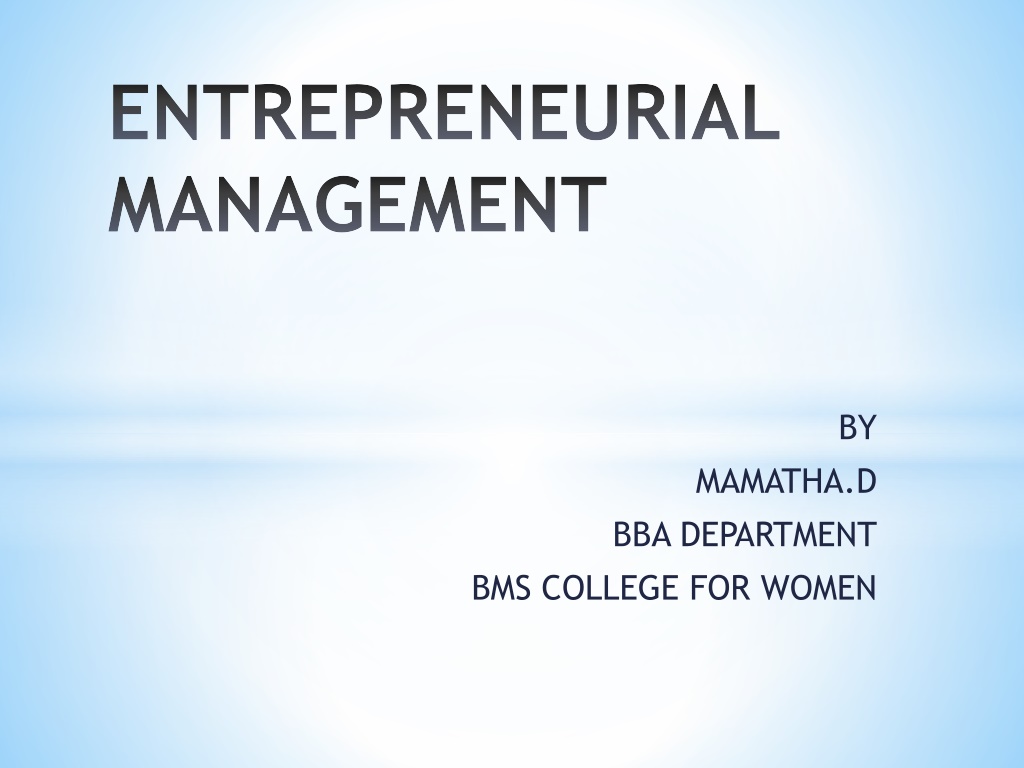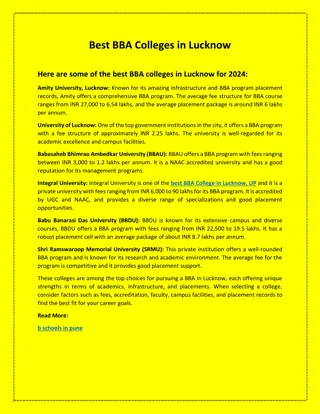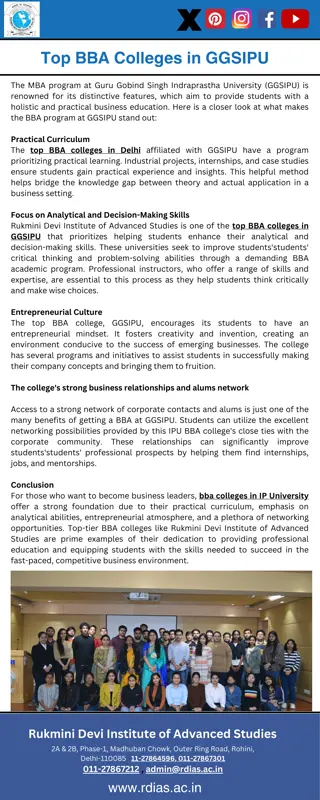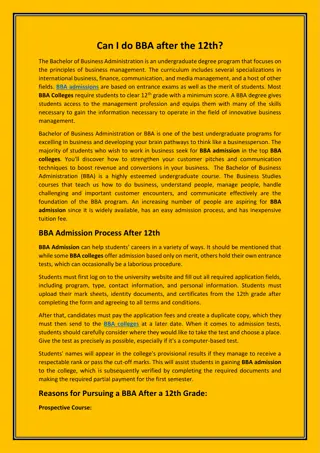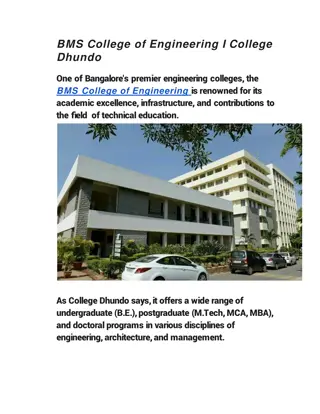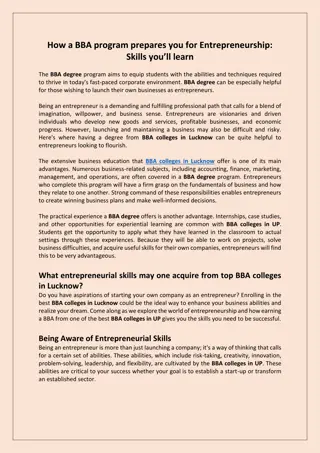Entrepreneurial Management by Mamatha D, BBA Department, BMS College for Women
This content covers Unit 1 of Entrepreneurial Management, focusing on entrepreneurship, the role of an entrepreneur, functions of entrepreneurship, differences between entrepreneurship, entrepreneur, and enterprise, and the functions and roles of an entrepreneur in economic development.
Download Presentation

Please find below an Image/Link to download the presentation.
The content on the website is provided AS IS for your information and personal use only. It may not be sold, licensed, or shared on other websites without obtaining consent from the author. Download presentation by click this link. If you encounter any issues during the download, it is possible that the publisher has removed the file from their server.
E N D
Presentation Transcript
ENTREPRENEURIAL MANAGEMENT BY MAMATHA.D BBA DEPARTMENT BMS COLLEGE FOR WOMEN
Unit 1: ENTREPRENEURSHIP 12 Hrs Introduction Meaning & Definition of Entrepreneurship, Entrepreneur & Enterprise Entrepreneurship, Entrepreneur & Enterprise Functions of Entrepreneur Role of Entrepreneur for Economic Development - Factors influencing Entrepreneurship - Pros and Cons of being an Entrepreneur Differences between Manager and Entrepreneur Qualities of an Entrepreneur Types of Entrepreneurs. Entrepreneurship Development- Need Problems National and State Level Institutions Differences between
INTRODUCTION The word Entrepreneur is derived from the French word Entreprendre which means To undertake . MEANING & DEFINITION OF ENTREPRENEURSHIP ENTREPRENEUR & ENTERPRISE
* DIFFERENCES BETWEEN ENTREPRENEURSHIP, ENTREPRENEUR & ENTERPRISE Entrepreneur Entrepreneurship Enterprise An entrepreneur one who undertakes and operates a new enterprise and assumes some accountability for the inherent risks. Entrepreneur is often with founder. Entrepreneurship starting new organizations, particularly new businesses generally in responses to identified opportunities. Entrepreneurship ranges in scale from solo projects to major undertakings creating many job opportunities. is the practice of Enterprise is the business unit involving risk and uncertainty synonymous enterprise is about spotting opportunities, creating new ideas confidence and capabilities to turn these ideas into working realities Enterprise utilizes the raw materials and other inputs in the process of production and having the The person who starts and operates a business enterprise entrepreneur. The entrepreneur is a coordinator as he coordinates all the three elements of production i.e. land, labor and capital. The process in which an entrepreneur starts and operates enterprise is entrepreneurship. Entrepreneurship is the coordination maintained by an entrepreneur. is an his business Enterprise serves as a framework within which decision concerning what to produce, how much to produce, where to produce are taken by the entrepreneurs The person who innovates something new is an entrepreneur. The innovation of something new or the process of entrepreneurship. The way in which an entrepreneur leads his manpower, motivates them for the achievement of the entrepreneurship. The risk bearing practice that is done by an entrepreneur is entrepreneurship. innovation is He who leads an enterprise towards its vision thorough motivation is an entrepreneur. leadership, firms goal is He who bears risk of the firm for the sake of making a reasonable profit is an entrepreneur.
FUNCTIONS OF ENTREPRENEUR Innovation Managerial function Decision Making Organisation and management Risk taking
ROLE OF ENTREPRENEUR FOR ECONOMIC DEVELOPMENT Role of Entrepreneur as an Innovator in Economic Growth Role of Entrepreneur in Generation of Employment opportunities
FACTORS INFLUENCING ENTREPRENEURSHIP 1. Economic Factors---- a) Availability of Capital b) Availability of raw materials c) Availability of Human Resources d) Adequate basic facilities 2. Social factors------- a) Customs and Traditions b) Social set up c) Rationality of the society 3. Cultural factors 4. Personality factors 5. Psychological factors 6. Legal and political factors
PROS AND CONS OF BEING AN ENTREPRENEUR Advantages: 1. Bridge the gap between and application 2. Work for self 3. Potential for Limitless Revenue 4. Freedom to Travel 5. Meet Like-Minded Professionals 6. Flexible Work Schedules 7. Control the Work Disadvantages: 1. Excessive Work Hours 2. Always on Call 3. Increased Stress Levels 4. Financial Sacrifices
DIFFERENCES BETWEEN MANAGER AND ENTREPRENEUR ENTREPRENEUR MANAGER 1. An entrepreneur is the owner of an 1. Manager is an employee of an organisation. organisation. 2. The goal of an entrepreneur is to 2. The goal of a manager is to serve the achieve the predetermined goals. organisation. 3. The entrepreneur is decision maker and 3. The manager is an execution of decision policy maker. and policy of the entrepreneurs. 4. Profit is the reward of an entrepreneur. 4. Salary is the reward for a manager. 5. The manager need not bear any risk. 5. The entrepreneur has to bear the risks of 6. The manager require the skills of dealing uncertainties. with public and employees. 7. The manager s return is certain. 8. Manages need minimum management skills or qualification. 6. The entrepreneur requires certain skill like innovation, desire to achieve the target. 7. The entrepreneur return is uncertain. 8.Entrepreneur does not need qualification.
* QUALITIES OF AN ENTREPRENEUR: Mental ability Creativity Clear objectives Achievement oriented Business secrecy Organiser Human relation ability Risk taker Communication skill Decision maker Technical knowledge[skill] Vision and Foresight Motivation Leadership Self-confidence Independence Long-term involvement Problem solving Social responsibility Business planning Optimistic Information seeker Effective strategies
TYPES OF ENTREPRENEURS: 1. According to types of business: --- a) Business Entrepreneur b) Trading Entrepreneur c) Industrial Entrepreneurs d) Corporate Entrepreneur e) Agriculture Entrepreneur 2. According to the use of technology a) Technical Entrepreneur b) Non-technical Entrepreneur c) Professional Entrepreneur 3. According to Motivation: a) Pure entrepreneur b) Induced Entrepreneur c) Motivated Entrepreneur d) Spontaneous Entrepreneur
4. According to stages of Development: - a) First Generation Entrepreneur b) Modern Entrepreneur c) Classical Entrepreneur d) Entrepreneurs by inheritance 5. According to Capital and Ownership - a) Private Entrepreneur b) State Entrepreneur c) Joint Entrepreneur 6. According to Age a) Young age entrepreneur b) Middle age entrepreneur c) Old age entrepreneur 7. According to scale of operation a) Large scale entrepreneur b) Small scale entrepreneur c) Medium scale entrepreneur 8. According to Area of Establishing a business - a) Rural entrepreneur b) Urban entrepreneur 9. According to gender - a) Men entrepreneurs b) Women entrepreneurs
ENTREPRENEURSHIP DEVELOPMENT: NEED: PROBLEMS No Policy at the National Level Problems at the Pre training Phase Over Estimation of Trainees Duration of EDPs Non Availability of Infrastructural Facilities Improper Methodology Mode of Selection Non Availability of Competent Faculty Poor Response of Financial Institutions No clear cut course of action Poor follow-up
NATIONAL AND STATE LEVEL INSTITUTIONS: MANAGEMENT DEVELOPMENT INSTITUTE (MDI) THE NATIONAL INSTITUTE FOR ENTREPRENEURSHIP AND SMALL BUSINESS DEVELOPMENT (NIESBUD) ENTREPRENEURSHIP DEVELOPMENT INSTITUTE OF INDIA (EDII) INSTITUTES FOR ENTREPRENEURSHIP DEVELOPMENT
*THE END *THANK YOU
